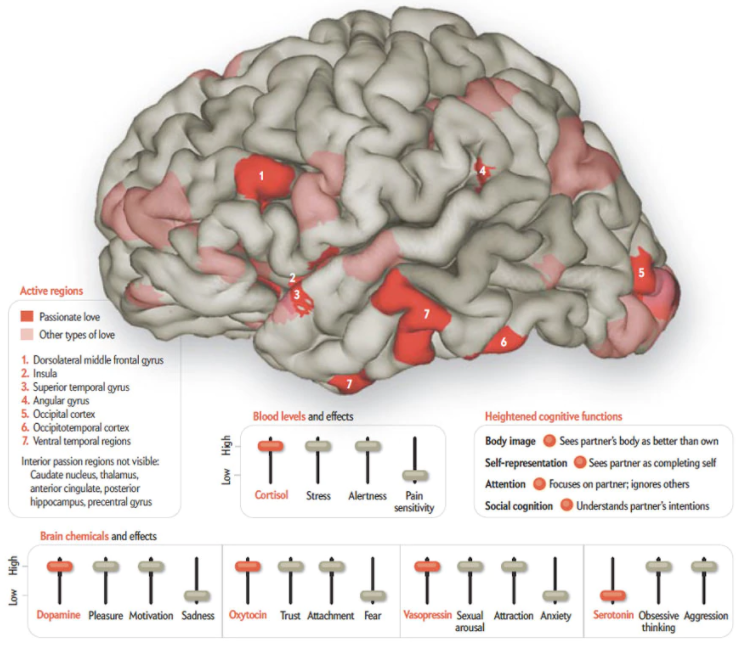Posted by PlayGround, July 12, 2017
They say that love is a million different diseases and they might be right. It might be a stranger, or someone at work, or maybe even your best friend… You never know when you’re going to get that crush, when the love virus will infect you and not let you go. And we should warn you: curing yourself of this disease is difficult and usually leaves long-term damage.
“We are wired to find love” – Helen Fisher
Researcher Helen Fisher (a biological anthropologist at the University of Rutgers and an expert in the chemistry of love) has spent her academic life trying to figure out what’s going on in the brains of those who are in the heady, butterflies-in-the-stomach throes of passionate romantic love. … Both are brain chemicals associated with pleasurable activities and excitement.
“The less my hope, the hotter my love” ― Terence
To learn more about our very real, very physical need for romantic love, Helen Fisher and her research team took MRIs of people in love — and people who had just been dumped, watch the 2008 TED talk below.
“Love is in us. It’s deeply embedded in the brain. Our challenge is to understand each other.” — Helen Fisher
Science of love: It really is all in the mind, say experts Chinese researchers are using MRI scans to track the emotion’s effects.
When we fall in love we all suffer from the same symptoms. No matter who you are, the pattern is going to repeat itself time and time again.
But what is it exactly that we fall in love with? Is it the physical presence of the person? Their exterior aesthetic and attitude? Or is it the person’s inner being and personality? And does the romantic attraction stem from our senses or from our intuition? The answer to all these questions is much simpler than we might think. The disease we call love is a simple matter of chemistry.
“Love is the only reality and it is not a mere sentiment. It is the ultimate truth that lies at the heart of creation.” Rabindranath Tagore
Adrenaline, dopamine, serotonin, oxytocin, testosterone… our hormones play a fundamental role in each phase of falling in love Some are shy in the face of love, some dive straight in at the deep end, others feel sick… Whatever our reaction, we are all victims of the same chemical processes. An explosive cocktail of drugs that our body is determined to push on us, whether we want them or not.
“My longing had no time when it ceases” – 8th century Japanese poet.
According to researcher Helen Fisher, each of these hormones plays a fundamental role in the different phases of love (sexual desire, romantic attraction, and long-term attachment or affection), and they are responsible for the way the initial butterflies in the stomach quieten down, eventually giving way to the more stable feelings of a longer relationship. Let’s have a look at what happens during each of these phases.
The Brain on Love by Diane Ackerman

The god of love lives in a state of need. It is a need. It is an urge. It is a homeostatic imbalance. Like hunger and thirst, it’s almost impossible to stamp out. Plato.
I. Desire – Desire is the first phase of love: the one that causes us to feel attracted to that specific person.
II. Attraction – The chemical love chain continues with dopamine, a neurotransmitter secreted by the brain and the adrenal glands that increase the release of testosterone.
III. Affection – The love disease reaches its peak with infatuation itself. The affection or attachment, the long-lasting bond that keeps a couple together, is partly regulated by the hormones oxytocin and vasopressin, which also affect the brain’s pleasure circuit.
Love can last
It was once believed that this phase also had an expiration date, but a study carried out by Bianca Acevedo, a neuroscientist from Cornell University in New York discovered in 2009 that love can last. In other words, the love chemistry can remain more or less stable over long periods of time.
Read full Playground article here
Reality Is Structured in Consciousness. by Deepak Chopra

Can Your Brain Fall in Love? By Deepak Chopra
– Brain research doesn’t really explain experience.
– Facts and data are simplifications of experience.
– Only self-knowledge knows about matters of the self.
– Brain responses are merely physical correlates, the way that piano keys correlate to what a musician is doing. Pianos don’t perform music, and the brain doesn’t have experiences.
– A perfect map of brain activity down to the level of single neurons says nothing about how the mind works.
– None of the above is contradicted just because the brain can influence our behavior. Stuck piano keys can ruin a musical performance; that means nothing about the nature of music.